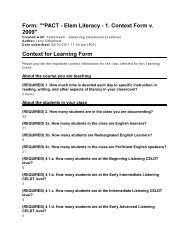The Tutoring Book - California State University, Sacramento
The Tutoring Book - California State University, Sacramento
The Tutoring Book - California State University, Sacramento
You also want an ePaper? Increase the reach of your titles
YUMPU automatically turns print PDFs into web optimized ePapers that Google loves.
One of my writers was told that in order to receive a higher grade on an essay, she needed to use<br />
more “academic” language. When I asked her if she knew what the professor meant by this, she replied<br />
hesitantly, “I think so.” Clearly, she was aware of the fact that she needed to change something. What<br />
she did not know was where to start or how to go about it, nor was I sure how to help her. You will find<br />
that many students think that their work can become more “academic” by simply adding words like<br />
“therefore” and “moreover” to what they already have written. Some students are thesaurus happy and<br />
replace their own words with more “academic” variations. Can we blame them? <strong>The</strong>re are no courses to<br />
teach students how to speak the language of the university. Though I have learned how to write academic<br />
discourse and I know what academic language looks like when I see it, trying to explain the concept to<br />
someone else proves rather difficult. It is much the same as trying to describe the color blue or define a<br />
concept like love. I suggest that before you begin to tutor, think about how you might best describe the<br />
language of the academy to your writers.<br />
Though there is no all-encompassing definition to be had, you can explain to your writers what<br />
academic writing typically values, or, if it is easier, what it does not. This is especially important for ESL<br />
students whose cultural conceptions of what constitutes “good” writing may be very different than those<br />
prided at the university (Ilona Leki specifically addresses this issue in chapter eight of her book<br />
Understanding ESL Writers). Telling our writers the expectations of the system does not necessarily<br />
mean that we agree with these conventions. In fact, often one must learn the dominant discourse in order<br />
to someday subvert the status quo; people such as Frederick Douglass and Dr. Martin Luther King have<br />
done just this in their attempts to bring about racial equality. Whenever possible, try and talk to your<br />
writers about the conventions of academic discourse. How is the writing that they are expected to<br />
produce in English 1A different than the language that they speak at home or to their friends? Why are<br />
there different expectations at the university? How is writing in college different than other writing they<br />
have done in the past? Questions such as these can possibly lead to discussions which will benefit both<br />
you and your writer. Be aware, however, that some of your students will not want to engage in such<br />
conversations and will instead give you a look that silently screams, “How is anything you are saying<br />
going to help me here and now with this paper!?” Often times, you will find yourself dispelling myths for<br />
the students about what academic writing is or is not. Your writers will constantly bombard you with<br />
questions like, “Is it okay to say this?”; “Should I do this?”; “Can I use this as an example?”<br />
With the student who was advised to make her paper more “academic,” I tried to help her<br />
strengthen parts of the essay. For example, she had many undefined terms, so we spent most of the<br />
session discussing how she could make her ideas more explicit. I suggest that you focus on one concept<br />
at a time – for example, ask your writer what he or she means by a certain key word or phrase, for often<br />
they are unsure how much information to provide to the reader or what, for that matter, counts as<br />
“common knowledge” at the university; I found that rarely did my writers provide too much information.<br />
Also, do not be afraid to compliment your writers when they do something well. <strong>The</strong>y often hear from<br />
professors what they are doing wrong, so try reminding them that they are doing a lot of things right, too.<br />
Furthermore, reiterate to your writers that writing is difficult and that their feelings of frustration are<br />
justified – that you, too, had and still have trouble with academic writing and that everyone must learn the<br />
conventions of academic discourse because no one speaks in such a way at home.<br />
While I agree with the men and women who wrote the Students’ Right to <strong>The</strong>ir Own Language that<br />
we would accomplish more if we focused on “precise, effective, and appropriate communication” (2)<br />
instead of dialect, as tutors we are, unfortunately, not in a position to do much about this. Because you<br />
have decided to become a writing center tutor, chances are you enjoy and are good at writing yourself.<br />
You have also had to conform to the standards of the academy. Sadly, in order to become a “successful”<br />
student, this is what one must do. Perhaps, however, you have not previously questioned the extent to<br />
which you have privileged academic discourse and standard English. It is my hope that in addition to<br />
123

















